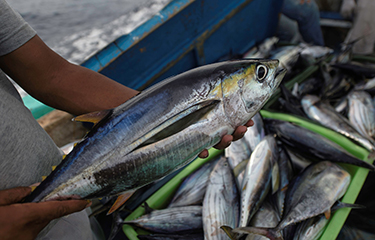Decisive action on yellowfin stock rebuilding needed in new year, IPNLF says

Urgent action is needed from members of the Indian Ocean Tuna Commission (IOTC) before and during its special session meeting planned for March to discuss the rebuilding of the overfished Indian Ocean yellowfin tuna stock, according to the International Pole and Line Foundation (IPNLF).
One of the world’s most economically important fishing area, spanning 70 million square kilometers, the Indian Ocean is responsible for up to 20 percent of the global production of tuna, IPNLF said. However, concerns have grown over the long-term sustainability of the Indian Ocean’s tuna stocks, particularly its yellowfin resource, which has been classified as overfished since 2015 and has been part of a rebuilding plan since 2016.
“The effectiveness of this rebuilding plan, the details which are contained under IOTC Resolution 19/01, has been hampered by ineffective implementation, non-compliance with existing measures by several fishing nations, ineffective management of drifting fish aggregating devices (dFADs) that has led to further increases in juvenile yellowfin mortality and too many exemptions for fleets that should also contribute to reducing overall catch levels. The stock remains overfished and has thus far showed no signs of recovery,” IPNLF said.
The COVID-19 pandemic prompted IOTC members to “avoid complex and time-consuming matters that would be difficult to accommodate in the virtual format that replaced the usual in-person meetings,” before their 24th session, held from 2 to 6 November, 2020. The decision means that no new conservation and management measures (CMMs) have been discussed or adopted by the commission “despite the urgency to rebuild yellowfin stocks by implementing effective management measures,” according to IPNLF.
An IOTC member, IPNLF was among a group of concerned parties urging the commission to schedule a special session in early 2021 to discuss “worrying state of Indian Ocean yellowfin” and the need for more robust management. That session will take place 8 to 12 March, 2021.
“The long-term viability of the region’s tuna fisheries is at risk. The consequences of Resolution 19/01 continuing to be ineffective will be felt most critically by small-scale tuna fisheries, especially those in developing coastal states that provide critical livelihood support to coastal communities," IPNLF Director of Science and the Maldives States Shiham Adam said. "We all have a duty to ensure that effective management measures are adopted at the special session in March. IPNLF will continue to work with its partners in the region, at both government level and with civil society, as well as with our key partners in the marketplace to help achieve this."
IPNLF acknowledged the difficulty of the task at hand.
“Recognizing the difficulty in reaching agreement on how tuna stocks should be managed within the Indian Ocean region, even when not faced with the severe disruptions caused by the pandemic, IPNLF [is] urging IOTC members to consider potential solutions well in advance of the special session meeting in March, emphasizing that any further delays in the implementation of management measures should not be an option,” the organization said. “A further worsening of the stock situation will not only contradict the collaborative and inclusive approach that is enshrined under UNCLOS, but will also impact the coastal communities that rely on these resources for their livelihoods and food security the most.”
IOTC said it plans to apply a precautionary approach to the management of tropical tuna in the Indian Ocean with the adoption of Resolution 12/01.
“States shall be more cautious when information is uncertain, unreliable, or inadequate and that the absence of adequate scientific information shall not be used as a reason for postponing to take conservation and management measures,” the commission said.
Photo courtesy of the International Pole & Line Foundation






Share